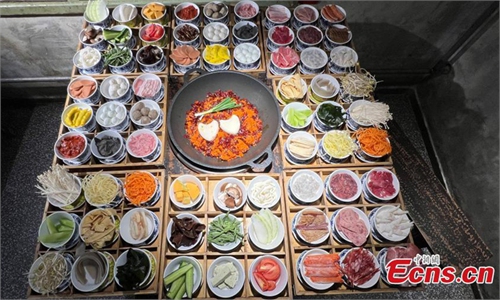
A typical Chongqing hot pot with origins from Southwest China Photo: VCG
Dressed in his usual neat attire, restaurant worker Wang Wenjun adds the final touches to a rich broth, the aroma of which permeates the air.
The hot pot chef from Southwest China's Chongqing Municipality is delighted to learn that his vocation for the last 25 years was finally acknowledged as a new profession.
According to the latest version of the Occupational Classification System of the People's Republic of China (PRC), formulated by the Ministry of Human Resources and Social Security, hot pot chef is now recognized as a new profession.
The announcement has very much boosted the spirits of those who now work in the hot pot industry.
"I suddenly feel more confident at work," said Wang, who is also vice chairman of the Chongqing Hot Pot Association.
Chongqing, a port city surrounded by the Yangtze and Jialing rivers, is famous for its spicy hot pot and such restaurants can be found just about anywhere in the city.
Based on the data from the Chongqing Hotpot Association, there have been more than 50,000 hot pot places with over 3.5 million people working in this booming food industry.
"Regardless of the size of the hot pot sector in Chongqing, industry professionals lacked a job title. And hot pot cookery has never been featured prominently in any culinary competitions," he said. "But, now things are changing for good."
The official recognition means increased visibility and more state support, which will boost the development of the industry, increase employment, and strengthen vocational education and training, according to industry insiders.
In 2015, Chongqing's Human Resources and Social Security Bureau had already identified hot pot chef as a characteristically local profession.
So far, more than 60,000 residents have obtained professional certification.
"In the future, we will improve the training system for hot pot chefs to provide them with a clear career path," said Chen Guohua, chairman of the Chongqing Hot Pot Association.
Wang believes that an increasing number of training bases will be established to promote the professional training of talents in the hot pot industry.
In 2021, the number of accredited hot pot professionals in Chongqing reached 16,600, generating a direct operating revenue of 60 billion yuan ($8.32 billion).
With the development of the hot pot industry, a hot pot chef is now required to have knowledge of food safety, nutrition, and new technology in addition to preparation.
Haidilao, a leading hot pot restaurant chain in China, also stands ready to embrace new opportunities brought about by recent developments.
"The past three decades have witnessed large scale production and standardization of hot pots, and the hot pot industry has increasingly emphasized systematic, professional and intelligent development," said Zhou Changchun, who works with Haidilao's R&D department.
"Skilled chefs will help Chinese hot pot go global," said Wang, expressing hopes that hot pot cooking could one day debut in the World Skills Competition.
Xinhua



